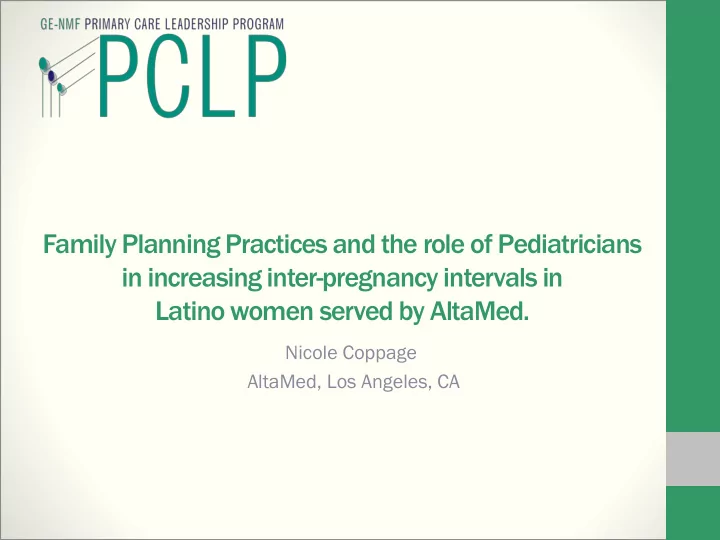

Family Planning Practices and the role of Pediatricians in increasing inter-pregnancy intervals in Latino women served by AltaMed. Nicole Coppage AltaMed, Los Angeles, CA
Introduction • Obser ervation ation : Though parents brining their children in for a 0-12 month well baby check up may not be planning for or desiring another child at this time, they aren’t utilizing effective birth control methods either. • Impact act : This presents a problem as it has been shown that short intervals between repeat pregnancies can have negative biological and psychosocial outcomes for both mother and child. • Goal : evaluate • 1.The extent of family planning practices, attitudes, and active birth control use in mothers with children 0-12 months old • 2. If pediatric family planning educational intervention provided to parents at 0-12 month well child checkups can prevent or decrease likelihood of unplanned pregnancies in mothers.
Background • 23% of Latino births are preceded by a short (<12 month) Inter- pregnancy interval. (1998 Khoshnood et al) • Controlling for ethnicity, age, education, birthplace, parity, tobacco use, obstetric and medical complications, prenatal care, and infant sex, women with a short IPI were 43 to 71 percent more likely to have VLBW and MLBW infants than women with an intermediate IPI . (1998 Abstract Fuentes-Afflick et al)
Background • Among adolescent mothers, studies have found that although mothers did not intend to get pregnant, they also did not intend to prevent pregnancy. (J. Herrman 2007) • Among adolescent mothers, birth control usage increases postpartum, but rates of discontinuation are high. (E. Wilson et al 2011) - Lack of education, - Lack of parental support - Loss of continuity of care. • Care for new mothers ends at 40 days postpartum -Opportunities for pediatricians to discuss family planning during 0-12 month well baby visits. • Ultimately, While this has been well documented amongst adolescent mothers, it is unclear how pervasive this phenomenon and these factors are among all mothers in a low-income Latino community.
Methodology • Through a survey to all age groups, we propose to evaluate the relationship between attitudes towards birth control and family planning practices in the low- income Latino community and explore the role of pediatricians in family planning to increase inter- pregnancy intervals.
Methodology: Survey • Fam amil ily Pl Plan anni ning ng Pr Prac acti tice ces : • Was your last pregnancy planned? • Are you with a partner at this time? • Have you spoken to your partner about birth control? • Ideally, when would you like to get pregnant again? • Are you intending to get pregnant again at this time? • If you do not wish to get pregnant at this time, what Birth Control methods are you using?
Methodology: Survey • Birth th Contr ntrol l Attitudes itudes : • If you do not wish to get pregnant at this time, what Birth Control methods are you using? • Not including condoms, how satisfied are you with your Birth Control method? • Not Including condoms, have you switched using a birth control method since giving birth? How many times? • Not Including condoms, did you start taking birth control but then stop since giving birth? Why? • If you are not using birth control other than condoms, what has prevented you from taking it thus far? • Have you ever felt pressured to use birth control medication? • Would you like your Pediatrician to discuss family planning with you?
Current Status • Administer 10 surveys to identify any issues • IRB Approval • Issues: • - Patient Literacy • - Staff administration of Survey
Future Direction • Using the survey results, we hope to develop a short, culturally competent, Family Planning intervention conversation for pediatricians to implement with new mothers. • Then ask a group of Pediatricians to implement this intervention and compare the Inter-Pregnancy Interval of their patients with that of Pediatricians not participating. • Determine if simple Family planning interventions by pediatricians during 0-12mo well child check-ups can increase the Inter-pregnancy Interval among Latino women.
Acknowledgements • Dr. Puri • Dr. Hochman • AltaMed • GE-NMF PCLP • The 2013 PCLP Scholars
Recommend
More recommend